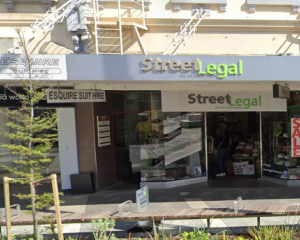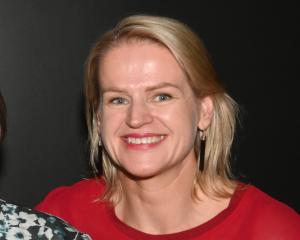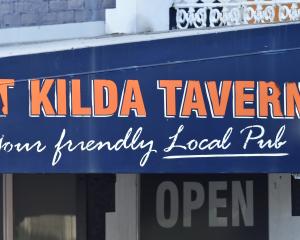When Hannah Catchpole started work at the Otago Racing Club, she didn't know her fillies from her furlongs.
With no prior involvement in the thoroughbred racing industry - or horses in general for that matter - she has been on a steep learning curve for the past five months.
But Miss Catchpole (33) candidly admits she "isn't trying to train a horse or grow grass'' and she sees being a newcomer to the industry as a positive.
"I always say Steve Tew doesn't know how to coach the All Blacks but he knows how to employ people that do,'' she said.
Engaging and enthusiastic, she is excited about the role, one that saw her trade the bright lights of Sydney for an office at Wingatui.
Sitting in that sunny office, she cuts a striking figure in a dress and heels, but the more sensible flat-shoe option is close by in case she needs to make a dash out to the track.
Miss Catchpole began work at the club in mid-November, replacing Andre Klein, who moved back to the United Kingdom to take up management of the Warwick Racecourse.
With a background in professional sport management and its operations and logistics, she was previously general manager of the Sydney University Football Club.
Her career path could have taken a much different turn - at various stages, careers in both the police and aviation beckoned.
But she has found what she loves doing.
Miss Catchpole grew up in Christchurch. Her father was transferred to the United Kingdom when she was 11.
The family lived there for three years and it was an "amazing' experience.
From there they moved to Melbourne, where Miss Catchpole completed her secondary schooling and undertook tertiary study.
Before a "gap'' year in the UK, she was accepted for a degree in aviation but, after her year away, she decided she did not like physics enough - or the two-seater plane she was likely to start flying in - to pursue that idea.
So she completed a bachelor of business degree, majoring in tourism and hospitality, thinking it would be the "most non-classroom-like-thing I could do''.
That turned out to be incorrect and the only class she really enjoyed was wine studies.
Meanwhile, her father had decided he was finished with corporate life and her parents bought a bookstore and also opened a Belgian chocolate store, which she helped get up and running.
By that stage, she knew she wanted to work in sport and was thinking probably events management, Miss Catchpole said.
In 2010, she moved to Dunedin - where her parents were now living - and started work at Craft Bar and Abbey Lodge.
With a love of rugby, she sent her curriculum vitae to all the Super Rugby teams but there were no jobs going.
Then a job in ticketing and membership at the Highlanders came up and that was her "in'' to the sport.
She was there for just under five years and loved it, particularly the "buzz'' around test match time, and she went on to look after country and amateur rugby.
While she enjoyed her job, she was keen to join her brother in the police force but was temporarily thwarted when she broke her ankle doing the police physical obstacle course, resulting in two plates and nine pins.
She quipped she held the course record - 45 minutes - as she asked the ambulance officer to wait until her sister, who was also applying for the police force, completed the course.
"I was like, 'that's fine, we can go now',' Miss Catchpole said, laughing.
While undergoing rehabilitation, she moved to the high-performance team at Otago rugby and found she really liked that.
However, she thought she probably would not go any further at the Highlanders as people tended to stay in their jobs because they liked them, so she headed back to Australia, still with a notion of joining the police.
Melbourne was getting a Super Rugby team and she kept "badgering'' the chief executive, keen to be involved if there was any opportunity.
Following a meeting with him, she was just about to push the button of the lift to leave, when team manager Scott Harrison arrived.
The pair chatted and she later got a phone call offering her a job.
The Melbourne Rebels made its Super Rugby debut in 2011 and it was exciting to work for a start-up team.
Melbourne was "not a rugby town'' so the majority of players were new to the city and the club became like a family.
Harrison knew her ambition was to be team manager but he was never threatened by it.
Instead, she learned much from him.
During that time, she was still contemplating the police option but, when she turned down a fitness test as she had a hairdresser's appointment, she realised she didn't have the resolve required to do it successfully.
Besides, she was loving what she was doing.
She got to travel with the team sometimes - "I'd like to think I was the big sister rather than the mum because I wasn't that old'' - although her duties did include regularly tying their ties properly.
For one game, she took over as team manager - the first female team manager in Super Rugby across New Zealand, Australia and South Africa, a milestone she described as "cool'' and one that was welcomed by clapping and cheering from the players.
Sadly, for the Rebels, there was not a good outcome.
"We got flogged and we have never had so many injuries in the first 10 minutes of the game ... but I did it. It was such a cool experience to do it and know you could do it.''
When her position was disestablished, she thought her "world was going to end''.
In hindsight, it was the best thing that could have happened, she said.
While working for a cycling organisation she scored an interview for a job at Wimbledon.
At the same time, two rugby players from her Rebels day contacted her to say the Sydney University Football Club - known as the breeding ground for future Wallabies - was looking for a general manager.
She was offered both jobs and chose Sydney over Wimbledon.
With seven teams, it was hard work and she was "always at the rugby''.
While very enjoyable, she started to look for a reason to "come home''.
Her family was in Dunedin and most of her friends were in Melbourne.
It was her parents who notified her of the job at Otago Racing Club and, next thing she knew, she had an interview.
She received a phone call offering her the job while in a taxi on her way to the Sydney University Football Club's annual fundraising luncheon for 700 people.
It made her day, particularly as it was also her birthday.
The club flew her over for Melbourne Cup day at Wingatui - on arrival, she discovered she'd left her dress hanging on a door at her Sydney home - and she started work a week later.
In leaving the rugby club and joining the racing club she had swapped one "family'' for another, and she was impressed with how everyone "pitches in'' at her new job.
There was a small, young team that, like her, was very driven.
A restructure over Christmas, with a desire to get roles more streamlined and defined, had worked well.
"I'm not trying to reinvent the wheel here. We are changing lots in terms of how we do things and operate, and be more professional in the finished product,'' she said.
There might not be the staff numbers of Auckland or Christchurch but the club could still achieve great things.
"I like to think we're a small club punching above our weight.''
She was full of praise for track manager Wayne Stevens.
"Everyone tells me we've got one of the best tracks in the country.''
And with her lack of racing knowledge, she did not make any decisions about racing without "running it past people that know what they are talking about''.
That knowledge was growing, however, and when she went to a race meeting in Auckland with her sister and a friend, she was the one that knew how to read a form guide.
Going to see the trainers in the morning was a nice way to start the day and seeing how they treated their horses and how hard they worked had given her a new appreciation for the industry.
It was not just about the glamour on race day, she said.
While there were huge challenges in the racing industry, she was excited by what could be achieved at the club, she said. Accepting the job had been the "right move''.
"Watch this space. Things are going to happen,'' she said.
She has bought a house and it was nice being near her parents and brother, while Dunedin afforded such a nice lifestyle.
"I don't know if I'll be in Dunedin forever but I'm certainly not going anywhere in the immediate future. I want Dunedin to grow. I think it's got so much to give,'' she said.
And there was the added bonus of being able to go to Forsyth Barr Stadium to watch rugby games - "and just enjoy it''.
"Someone else has to worry about the tickets.''












